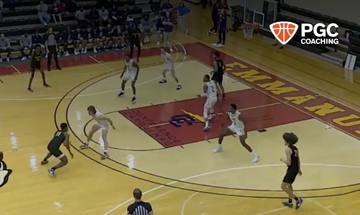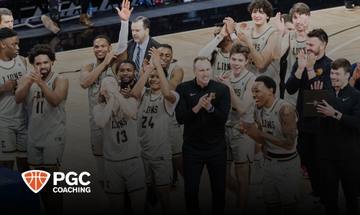The Season’s Over—Now What? How Great Coaches Win the Offseason
As coaches, we preach to our players that the offseason is where they separate themselves. But the truth is—it’s where we separate ourselves too.
If we’re not growing, our team isn’t either.
That’s why I see May not as an ending, but as a beginning. The season’s over, yes—but now the real work begins. For our players. For our staff. And for us as leaders.
Here’s how we approach the offseason in our program—and how you can lead your team to real growth before next season tips off.
In addition to the list below, I encourage you to check out these other helpful tools that will help you enhance and grow during the off season…
- Master Planning: The Missing Key to Better Practices and a Stronger Season
- How to Execute a Great Basketball Practice
- How to Break Down Game Film as a Coach: A Post-Game Blueprint
1. Start with a Team Meeting—But Give It Time
We always give our players a few days after the season to step away and breathe. The emotional toll of a season can cloud their perspective. Once the dust settles, we gather for a team meeting that’s more of a conversation than a lecture.
We ask questions like:
- What do you think held us back this year?
- Where did we grow?
- What distractions did we never fully overcome?
And we listen—really listen.
Some players will open up. Others won’t. That’s why we also hand out a written evaluation. We ask them to reflect on:
- Their own performance
- Work ethic and commitment
- Team dynamics
- And yes—even our coaching
We learn a lot from those evaluations—some encouraging, some convicting. But all of it helps us grow.
2. Hand Out the Summer Schedule (Early!)
Let’s be honest—summer calendars fill up fast. If we want buy-in from parents and players, we’ve got to communicate clearly and early.
At that first meeting, we hand out a tentative summer schedule with:
- Team workouts
- Camps we’re attending
- Dates we need help running youth camps
- Any team-building or film sessions
But we also communicate something else: This isn’t enough.
If a player thinks those scheduled team workouts are going to get them where they need to be, they’re mistaken. They need to find time—daily—to work on their individual game.
We tell them, “If you sleep 8 hours and spend 90 minutes eating, you still have 14.5 hours left in the day. Can you give 1 of those hours to becoming a better player?”
Their answer in July will be evident in October.
3. Create a Development Plan for Every Player
Not every player can afford a trainer or shooting machine. That doesn’t mean they can’t get better.
We put together simple, effective offseason workout plans for our team, covering:
- Shooting and finishing progressions
- Ball-handling routines
- Strength and movement patterns
- Film assignments
And because we film every game, we encourage our guys to study their film. Not just highlight plays—possessions where they missed a rotation, passed up a good shot, or gave up a rebound.
Film doesn’t lie. And it’s one of the most underutilized tools for growth in the offseason.
4. Evaluate Your Staff (and Yourself)
Player development is crucial—but so is coach development.
We review the written player evaluations and ask:
- Where did we help players grow?
- Where did we fall short?
- What do we each need to get better at before next season?
We have honest conversations about staff roles, energy, and execution. Because the culture we want can’t be built by players alone.
5. Break Down the Numbers
If you run the Read & React like we do, you know it’s not about running “plays” — it’s about executing habits.
That’s why I love charting every possession: offense and defense.
We look at:
- Points per possession in wins vs. losses
- Which Layers of Read & React broke down most
- Where we consistently gave up points on the defensive end
Then we use that data to shape how we train. No guessing. No assuming. But targeting what needs attention.
6. Invest in Development
In our program, we ask players to invest in their growth. It’s only right we ask the same of ourselves.
I believe every coach should use the offseason to invest in their development. This can be through clinics, online coaching memberships, or masterclasses. You’ve got six months—make it a priority.
Here are a few we love:
- PGC Coaching Membership
- Coaches Clinics at PGC Camps
- Free Coaching Masterclass
Stay a learner. Stay curious. Our players need us to.
7. Don’t Forget What Matters Most
Coaching is all-consuming. The film, the practices, the travel, the late nights. We give so much—and often, it’s our families who sacrifice most.
That’s why the final thing I’d challenge you with this offseason is this: schedule time for your family. Take the trip. Be present. Turn off the phone.
I’m not always great at this, but I’ve never regretted the time I gave to my wife and kids. This job doesn’t get easier, but being intentional with what matters most helps keep you grounded for the long haul.
If you want a better team next season, become a better coach this offseason.
Growth doesn’t happen by accident—it’s built through intentional evaluation, planning, and consistent effort.
Want to go deeper?
Subscribe to the Hardwood Hustle Podcast for weekly conversations on leadership, culture, and building programs the right way.
FAQ: Basketball Offseason Coaching Strategies
Q: What should coaches do right after the basketball season ends?
A: Great coaches begin the offseason by giving players time to decompress, then holding a reflective team meeting. Use this time to ask thoughtful questions about team dynamics, growth, and challenges. Hand out anonymous evaluations to gather honest feedback about players and coaching.
Start with curiosity. Use postseason evaluations to inform your offseason plan, not just justify your results.
Q: When should I give my players the summer schedule?
A: Early! Families plan ahead, so sharing your offseason calendar right after the season ends increases buy-in. Include team workouts, tournaments, youth camps, and film sessions. Communicate clearly that team workouts are just the foundation—individual work is still essential.
Print and share your summer schedule at your first postseason meeting to eliminate confusion and encourage full participation.
Q: How do I build individualized player development plans?
A: Break each plan into four core areas:
- Shooting and finishing drills
- Ball-handling and movement skills
- Strength and conditioning goals
- Film study assignments
Tailor these to each player’s role, goals, and skill gaps. Emphasize that consistency—not complexity—creates offseason growth.
Use a shared Google Doc or PDF template to track player progress and encourage accountability over time.
Q: What should coaches look for when reviewing player evaluations?
A: Pay attention to repeated themes in player feedback, especially about culture, communication, and development. Are your players clear on expectations? Do they feel supported and challenged? Don’t just evaluate them—use their input to evaluate yourself and your staff.
Hold a staff debrief using player evaluations to reflect honestly and recalibrate before next season.
Q: How do you use data from the past season to guide offseason training?
A: Use game film and efficiency charts to identify patterns. Analyze:
- Points per possession
- Shot selection by zone
- Read & React layer breakdowns
- Defensive lapses and rotations
Then, design workouts that directly target those trends. Let data—not emotion—shape your offseason.
Track film stats weekly during the season so your offseason plan is backed by real numbers, not guesswork.
Q: What’s a good way to invest in coaching development during the offseason?
A: Prioritize learning through:
- Coaching clinics
- Online memberships (like PGC Coaching)
- Masterclasses
- Book studies or mentorships
Just as players must train year-round, great coaches grow in the offseason. Even one new concept can reframe how you lead your team.
Join a coaching community or register for a summer clinic to stretch your thinking and connect with like-minded coaches.
Q: How can assistant coaches grow during the offseason?
A: Assistants should reflect on their role, attend clinics, and contribute to summer workouts. Encourage them to develop new skills—like film tagging, skill development drills, or leadership tools—that can serve your staff better in the fall.
Assign each assistant a specific growth area to study and present before the next season begins.
Q: Why is rest important for coaches after a long season?
A: The grind of a season takes a toll. Coaches who rest well return with more clarity, creativity, and connection. Rest also honors the families who sacrifice during the season. Taking time to recharge isn’t lazy—it’s essential.
Schedule time off now—protect your energy so you can pour more into your team next season.
Q: How can film study help players grow in the offseason?
A: Film reveals blind spots. Encourage players to review game footage to identify missed reads, poor shot choices, or defensive breakdowns. Pair this with goal-setting and drills that address their film observations.
Send each player 3–5 curated film clips from the season and use them to spark an individual improvement plan.
Q: Where can I find more resources for offseason coaching development?
A: Join the PGC Coaching Community. You’ll get access to coaching clinics, skill development plans, and leadership tools designed to elevate your program. It’s like having a team of mentors at your fingertips.
Start your 7 day FREE trial today and lead your team—and yourself—into your best season yet.
The offseason isn’t a break—it’s a launchpad.
When coaches lead with clarity, purpose, and humility, the team gets better. And it starts with your willingness to grow first.
TJ
Check more practice Program Administration & Off-Court Management resources here.
About the Author
TJ Rosene
Coach TJ Rosene, head coach of the Emmanuel University men’s basketball team and Director of Coach Development for PGC Coaching, has spent his career shaping young athletes both on and off the court. With over 400 career wins and 12 seasons of 20+ wins, Rosene’s coaching experience is extensive and impressive. His teams have competed in six national championship games, winning three NCCAA National Championships. Under his leadership, the Lions made their NCAA Division II debut in 2018-19 and quickly captured two season titles and one tournament title, along with an appearance in the NCAA Division II Sweet 16 in 2021./p>
Rosene’s success expands far beyond the scoreboard. He’s been named National Coach of the Year three times and Conference Carolinas Coach of the Year twice. But for Coach Rosene, the most meaningful part of his work is the lasting impact he has on his players’ lives. As he puts it, “Coaching is a rare opportunity to shape and mold the lives of young people. It’s a privilege that I never take for granted.”
New Here?
Get coaching tips and tools like these delivered to your inbox each week!
Join the 15,000 coaches we’ve assisted…

Related Articles
How to Break Down Game Film as a Coach: A Post-Game Blueprint
Want to win more? Master the art of post-game film review with our step-by-step system that drives player growth and team success.
How Assistant Coaches Can Add Value: 5 Tracking Tips from the NBA
Want to stand out as an assistant coach? Learn how preparation, tracking, and initiative can turn you into an indispensable asset on the bench.
How Basketball Coaches Process the End of the Season: What to Do When the Gym Goes Quiet
The season ends, but the emotions linger. Here’s how coaches can process the ending without rushing the reset.
About PGC
PGC Basketball provides intense, no-nonsense basketball training for players and coaches. Our basketball camps are designed to teach players of all positions to play smart basketball, be coaches on the court, and be leaders in practices, games and in everyday life.
We combine our unique PGC culture with a variety of teaching methods and learning environments to maximize the learning potential of those that attend our sessions. In addition to spending 6-7 hours on the court each day, lessons will be reinforced through classroom sessions and video analysis.
Our goal at PGC is to empower you with the tools to fulfill your basketball dreams, while also assisting you in experiencing the joy of the journey.
To learn more about PGC Basketball, including additional basketball training tips and videos, visit our YouTube Channel or find us on Facebook, Instagram, and Twitter.














Share This Post